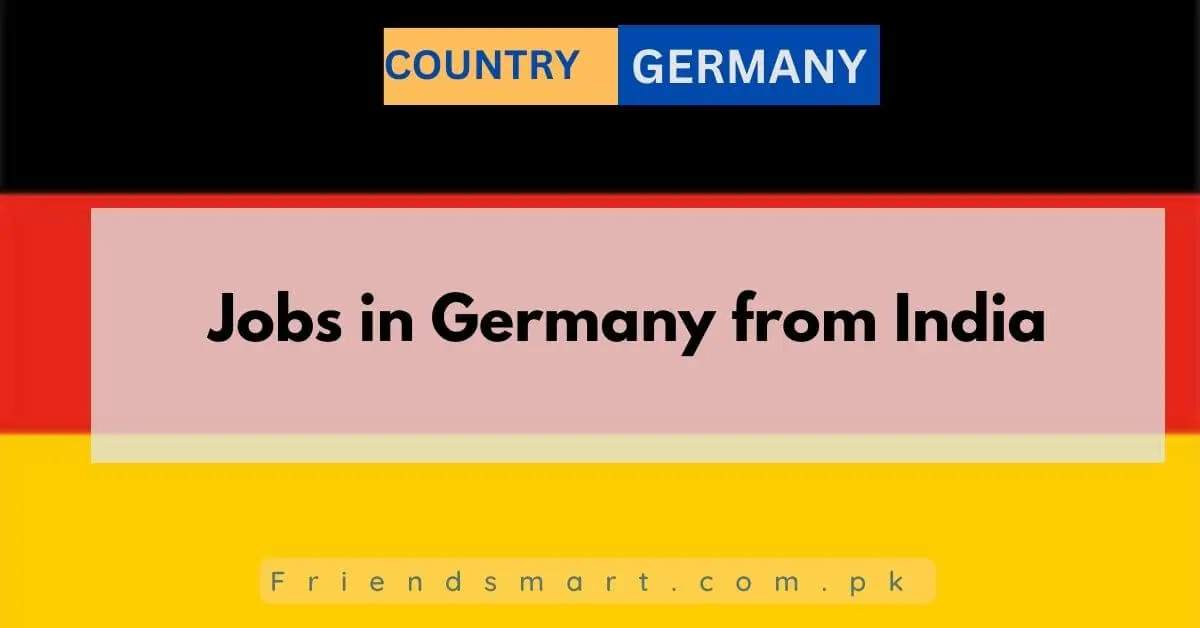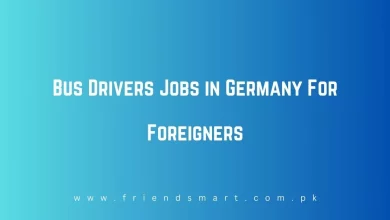Jobs in Germany from India 2024 – Apply Now

Indian professionals who are ambitious and looking for lucrative employment opportunities abroad frequently ask, “How do you get a Job in Germany from India.” Germany, the largest economy in Europe and a hotbed of innovation and growth, is an alluring destination for international professionals. Job hunting in Germany can be a life-altering experience due to the country’s low unemployment rate, high demand for skilled workers, and exceptional quality of life.
In this detailed guide, we will walk you through the steps necessary to land your dream job in Germany. We will cover everything from understanding the German job market and improving your resume to obtaining a work visa and adjusting to your new life. Together, let’s embark on this exciting journey!
1. Understanding the German Job Market
Sectors with high demand for international talent
Germany’s economy is diverse, with numerous sectors in need of skilled workers. These are some of the most in-demand industries for international talent:
- As a global leader in technology and innovation, Germany has a high demand for information technology (IT) professionals, such as software developers, data scientists, and cybersecurity specialists.
- With its renowned automotive and manufacturing industries, Germany is always on the lookout for qualified mechanical, electrical, and automotive engineers, among others.
- Germany’s need for medical professionals, such as physicians, nurses, and healthcare administrators, is increasing as the country’s aging population demands more healthcare services.
- Renewable Energy: Germany’s commitment to renewable energy, including solar, wind, and bioenergy, has created ample opportunities for professionals in the field.
- Research and Development (R&D): German R&D institutions and universities are always on the lookout for seasoned researchers and scientists, especially in biotechnology, materials science, and nanotechnology.
Read More: 10 Jobs in Germany For Indians | Visa Sponsorship Jobs
Typical Work Culture and Expectations in Germany
Understanding the German workplace culture is essential for successful job integration. Important factors to consider include:
- Germans value punctuality and expect all participants to be on time for meetings and appointments. It is considered unprofessional and disrespectful to arrive late.
- The German work culture emphasizes efficiency and well-structured workflows. Be prepared to work diligently, adhere to established procedures, and meet deadlines.
- Formality: German workplaces are typically more formal than those in India, with distinct hierarchies and titles. Respectfully address your coworkers and superiors by using their proper titles and last names unless instructed otherwise.
- Work-life balance is highly valued in Germany, where people typically do not work long hours or on weekends. Explore your new surroundings and engage in hobbies during your free time.
Popular cities for ex-pats and job opportunities
Numerous German cities offer exciting employment opportunities to international professionals. Popular alternatives include:
- Berlin is a thriving center for startups, technology, and creative industries that attracts professionals from around the globe.
- BMW and Siemens are headquartered in Munich, a city renowned for its automotive and manufacturing sectors.
- As the financial capital of Germany, Frankfurt is the ideal location for those in banking, finance, and insurance.
- Hamburg offers opportunities in industries such as media, aerospace, and renewable energy.
- Mercedes-Benz and Porsche have their headquarters in Stuttgart, which is also a major automotive and manufacturing center.
2. Preparation before Applying
Learning the German language
- Even though many German businesses operate in English, knowing German substantially improves your employment prospects. It can help you navigate the job market, comprehend job requirements, and more easily integrate into the workplace.
- Language courses and certifications are recommended: Enroll in a German language course at a reputable institution, such as the Goethe-Institut. Aim for a minimum Common European Framework of Reference for Languages B1 or B2 level (CEFR). Consider obtaining a language certification, such as TestDaF or Goethe-Zertifikat, to demonstrate your fluency to prospective employers.
Recognition of Indian qualifications in Germany
- Before applying for jobs in Germany, ensure that your Indian degrees are recognized there. For regulated professions such as engineering, medicine, and law, recognition is crucial.
- Resources for obtaining a qualification evaluation: The Central Office for Foreign Education (ZAB) and the Recognition in Germany portal are two helpful resources for gaining an understanding of the recognition process and determining the equivalence of your qualifications. Additionally, you may consult the Anabin database to compare your Indian degree to its German equivalent.
Enhancing your CV and cover letter
- Adapting your CV to the German format: German employers expect a specific format for CVs. Ensure your resume is current, well-structured, and concise. Include your contact information along with your professional experience, education, language skills, and certifications. In Germany, it is customary to include a professional-looking photograph. Keep your resume to no more than two pages.
- Advice for writing a persuasive cover letter: Your cover letter should be tailored to the position for which you are applying, emphasizing the skills and experiences that align with the job’s requirements. Maintain brevity and a formal tone. Explain why you are applying and why you are a strong candidate. Keep the cover letter to a single page and check for typos.
3. Job Search Strategies
Online job portals and websites
Utilize popular job search websites to locate employment opportunities in Germany. Some trustworthy options include:
- Federal Employment Agency (Bundesagentur für Arbeit): This is Germany’s largest official job portal, listing openings in a variety of industries.
- LinkedIn: Numerous German companies post job openings on LinkedIn, making it an invaluable networking and job-searching resource.
- StepStone is the leading job portal in Germany, providing job listings across industries and levels of experience.
- Similar to LinkedIn, XING is a popular German professional networking site that offers job listings and networking opportunities.
Networking through professional associations and social media
By joining industry-specific associations, attending conferences, and participating in online forums, you can expand your professional network. Engage in pertinent discussions with professionals in your field on social media platforms such as LinkedIn and XING.
Attending job fairs and career events
Job fairs and career events are excellent venues for networking with prospective employers and learning about available employment opportunities. Keep an eye out for international professional-oriented events, such as the Expat Job Fair in Germany.
Partnering with recruitment agencies
Consider collaborating with specialized recruitment agencies to assist you in locating suitable employment opportunities. These agencies have connections with German employers and can match you with positions that match your qualifications and experience.
In the following sections, we will discuss applying for a German work visa, relocating to Germany, and adapting to the German work culture and environment.
4. Applying for a German Work Visa
Types of German work visas for Indians
To obtain employment in Germany as a citizen of India, you’ll need a work visa. The most prevalent types of work visas are:
- General Employment Visa: For skilled professionals with a recognized university degree and a legally binding job offer from an employer in Germany.
- EU Blue Card: For highly qualified professionals who possess a recognized university degree, a binding job offer with a minimum salary requirement, and proficient language skills.
- This visa allows you to remain in Germany for up to six months while searching for employment. You must have a degree from an accredited university and sufficient funds to support yourself during your stay.
Documentation and application process
To apply for a German work visa, you must take the following steps:
- Before applying for a work visa, you must have a legally binding job offer from a German employer.
- Prepare the required documentation: Gather the necessary documents, such as a valid passport, visa application form, job contract or letter of offer, proof of health insurance, and proof of qualifications.
- Schedule a visa appointment: Schedule an appointment to submit your visa application at the German embassy or consulate in India.
- Attend the visa interview. Bring all required documents to your appointment, and be prepared to pay the visa application fee. You may be required to attend an interview as part of the application process.
Tips for a successful visa application
- Be diligent and organized. Ensure that all of your documents are accurate, exhaustive, and current.
- Be honest: Providing false information on a visa application can result in visa denial or future complications.
- Get ready for the interview by familiarizing yourself with typical interview questions and being prepared to explain why you want to work in Germany.
5. Settling in Germany
Finding accommodation
Start searching for housing prior to your move to Germany. Websites such as ImmobilienScout24 and WG-Gesucht can assist in the search for apartments or shared housing. Consider serviced apartments or Airbnb while you search for a permanent residence.
Registering at the local authorities
You must register your address with the local Residents’ Registration Office (Einwohnermeldeamt) within two weeks of your arrival in Germany. For registration, you must present your passport, visa, and rental agreement.
Opening a bank account and other essential steps
Open a German bank account to manage your finances and facilitate salary payments. Deutsche Bank, Commerzbank, and Sparkasse provide services for foreign nationals. In addition, obtain a German SIM card for your mobile phone and become familiar with the local transportation options.
Adapting to the German work environment and culture
Spend time learning and adapting to the German work culture. Be punctual, productive, and courteous in your interactions with coworkers. Additionally, learning German will facilitate your integration into the workplace and community.
Benefits of Jobs in Germany from India
- Strong Economy: Germany’s economy is robust and stable, providing an abundance of employment opportunities in a variety of sectors. The nation is renowned for its technological, engineering, manufacturing, and healthcare sectors.
- A Prominent Work Environment: German corporations are frequently renowned for their dedication to excellence, ingenuity, and productivity. Engaging in work within such an environment can yield significant professional growth.
- Competitive Salaries: In Germany, salaries are generally competitive, and the high quality of life compensates for the relatively high cost of living.
- employment Security: Strong labor laws in Germany give employees a high priority when it comes to employment security. Generally speaking, employment contracts are tightly regulated, which affords employees stability.
- Healthcare System: The healthcare system in Germany is highly developed and easily accessible. You would be eligible for statutory health insurance as an employee, which would guarantee that you obtain essential medical treatment.
- Social Benefits: Social benefits encompass a range of provisions that are mandatory for employees in Germany. These benefits consist of family allowances, unemployment benefits, and pension schemes.
- Quality Education: Germany offers a high standard of education at both the secondary and tertiary levels, which is ideal for those who intend to bring their families or pursue additional education there.
- Work-Life Balance: German businesses frequently place an emphasis on maintaining a wholesome work-life balance. This cultural element may facilitate a more leisurely and gratifying way of life.
- A Multicultural Environment: Germany is renowned for its multicultural and heterogeneous populace. Such a milieu can facilitate exposure to diverse cultures and points of view.
- Proficient Language Abilities: Employment in Germany may augment one’s linguistic abilities, specifically when one is situated in an environment predominantly spoken German. Increasing one’s proficiency in German can provide access to new opportunities.
Conclusion
Obtaining a job in Germany from India may appear daunting, but it is possible with thorough preparation, determination, and the appropriate resources. By gaining an understanding of the German job market, enhancing your resume, and obtaining a work visa, you will be well on your way to a rewarding career in Germany. Embrace the chance to grow professionally, experience a new culture, and start a new and exciting chapter in your life.
For More Info:
Email Your CV, and We’ll Find the Best Pathway For you: info@friendsmart.com.pk
People Also Asked
-
Can I apply for jobs in Germany if I am residing in India?
Yes, it is possible to apply for jobs in Germany from India via online job portals, professional networking sites, and recruitment agencies. Before moving to Germany, it is recommended to have a valid work visa or job seeker visa.
-
What is the average annual salary for professionals in Germany?
The average salary varies by industry, location, and experience level. Nevertheless, Germany is renowned for its competitive wages and high standard of living. On websites like Glassdoor and Payscale, you can research the salary ranges for your profession.
-
How do I have my Indian credentials recognized in Germany?
Consult resources such as the Central Office for Foreign Education (ZAB), the Recognition in Germany portal, and the Anabin database to have your credentials recognized in Germany. These platforms will guide you through the process of verifying the comparability of your credentials.
-
Can I switch jobs in Germany while working on a work visa?
Yes, it is possible to switch jobs while working in Germany on a work visa. If you are a holder of an EU Blue Card or a work visa tied to a specific employer, you may be required to notify the immigration authorities and obtain approval before changing jobs.



